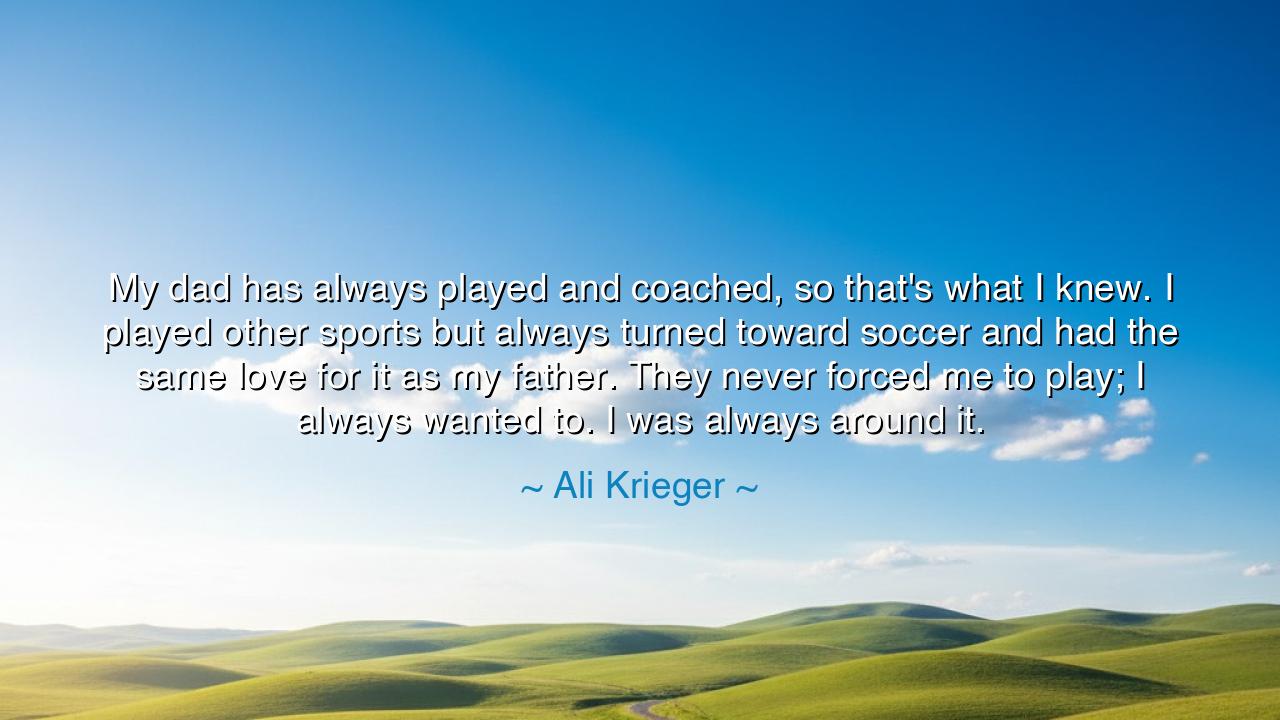
My dad has always played and coached, so that's what I knew. I
My dad has always played and coached, so that's what I knew. I played other sports but always turned toward soccer and had the same love for it as my father. They never forced me to play; I always wanted to. I was always around it.






Hearken, children of the ages yet to come, and contemplate the reflective words of Ali Krieger, who said: “My dad has always played and coached, so that's what I knew. I played other sports but always turned toward soccer and had the same love for it as my father. They never forced me to play; I always wanted to. I was always around it.” Within these words lies a meditation on inheritance, passion, and the nurturing of love through presence, revealing that the greatest devotion often springs not from obligation, but from immersion and example.
Krieger’s reflection teaches that exposure and environment shape the heart as much as instruction. The ancients understood that the young absorb wisdom and habit through example: the apprentice who watches a master, the child who sees courage embodied, the student who witnesses devotion in practice. By simply being present in her father’s world of soccer, Krieger’s desire and love for the sport were nurtured organically, growing in tandem with her curiosity and skill.
Consider the story of Pele, who grew up in the small town of Três Corações in Brazil. His father, a former footballer, introduced him to the game, providing a space where soccer was not demanded, but lived and felt. Pele’s own passion was ignited by observation and joyful engagement, not coercion. Krieger’s experience mirrors this principle: immersion in a craft, when coupled with freedom and curiosity, cultivates not only skill but enduring love and commitment.
Her words also emphasize the power of autonomy in the cultivation of excellence. Krieger’s parents did not force her to play, yet the freedom to choose allowed her natural inclination to flourish. The ancients understood that mastery is not sustained by compulsion; it emerges from passion. Socrates’ pupils excelled because they were drawn to philosophy, not bound to it, and Alexander the Great achieved greatness through the alignment of personal drive with guidance from Aristotle.
Being “always around it,” Krieger suggests, was as formative as the coaching itself. The ancients revered the value of proximity and repeated observation, knowing that immersion in a practice—whether martial, artistic, or intellectual—develops intuition, skill, and understanding that no formal instruction alone can impart. The rhythms, habits, and language of a craft seep into the soul when lived daily, shaping excellence quietly but profoundly.
From this reflection emerges a timeless lesson: passion cultivated from freedom, example, and presence endures longer and burns brighter than that imposed by demand. True greatness is born from both inspiration and choice, from being immersed in a world of skill while retaining the joy of personal desire. Krieger teaches that love for a craft is nurtured in environment, example, and freedom, not in coercion.
Practical guidance flows naturally: surround children or apprentices with examples of excellence and devotion, allow freedom to explore, and cultivate curiosity. Provide space for observation, engagement, and play, understanding that immersion often inspires deeper commitment than instruction alone. Encourage passion without pressure, and skill without coercion, allowing excellence to grow organically.
Children of the ages, let Ali Krieger’s teaching illuminate your hearts: greatness is nurtured not by force, but by exposure, presence, and the freedom to choose one’s path. Immerse yourself in the worlds you love, observe and learn, and allow passion to guide your pursuit. For it is in freedom, example, and consistent engagement that skill, joy, and enduring mastery are born, forging a life both accomplished and beloved.
If you wish, I can also craft a more narrative, evocative version, portraying young Ali Krieger immersed in the world of soccer, the sights, sounds, and emotions that shaped her path, perfect for oral storytelling. Do you want me to do that?






AAdministratorAdministrator
Welcome, honored guests. Please leave a comment, we will respond soon